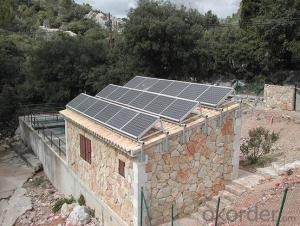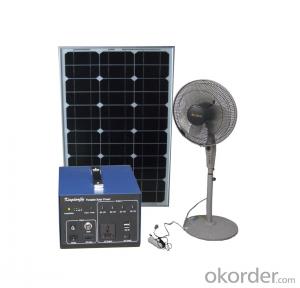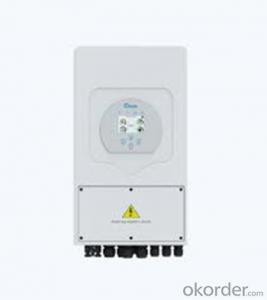currogated Roof clamp
- Loading Port:
- China Main Port
- Payment Terms:
- TT OR LC
- Min Order Qty:
- -
- Supply Capability:
- -
OKorder Service Pledge
OKorder Financial Service
You Might Also Like
Versolsolar providing all those widely used clamps for different installation solutions.
We have test installation of all clamps in our factory to ensure it’ll save your time and labor cost.
Clamps made by Aluminum alloy or stainless steel with highly stability and a perfect fixation on the roof.
Choose the suitable clamp for the corresponding roof as showed in the following table.
With triangular supporting frames, it's possible that modules will be installed with a certain angle to optimize the power of sunshine. Versolsolar offers triangular supporting frames in aluminum or galvanized steel. For Customized Size and Installation Angle
- Q:Can solar energy systems be used for waste management?
- Yes, solar energy systems can be used for waste management. Solar power can be utilized to power various waste management processes such as waste-to-energy systems, composting facilities, and recycling plants. Solar panels can generate electricity to run equipment, machinery, and lighting, reducing the reliance on traditional energy sources and minimizing the carbon footprint of waste management operations. Additionally, solar energy can be integrated into off-grid waste management solutions in remote areas, making it a sustainable and environmentally friendly option for waste management.
- Q:How does the cost of solar panels vary based on the manufacturer?
- Solar panel costs can differ greatly depending on the manufacturer, with several factors contributing to these price variations. To begin with, manufacturers' solar panels can differ in quality and efficiency. Some invest extensively in research and development, leading to higher-priced but more efficient products. These panels can generate more electricity per square meter, offering better long-term value. Furthermore, a manufacturer's reputation and brand recognition can impact solar panel costs. Well-established manufacturers with a proven track record of producing reliable and durable panels often have higher prices. This is because their products are perceived as more trustworthy and come with extensive warranties and customer support. Manufacturing scale and volume also play a role in cost differences. Larger manufacturers benefit from economies of scale, enabling them to produce solar panels at a lower unit cost. They can negotiate better terms with suppliers, access advanced production technologies, and optimize their operations more efficiently. These cost savings can then be passed on to consumers, resulting in more competitive prices. Lastly, the country of origin affects solar panel costs. Labor and production costs can vary significantly across regions, leading to variations in manufacturing expenses. Panels made in countries with lower labor costs may have a lower price tag compared to those produced in countries with higher labor costs. While cost is an important factor to consider when choosing solar panels, it is crucial to also take into account other aspects such as warranty, durability, efficiency, and after-sales support.
- Q:Can solar energy systems be used for powering RVs or boats?
- Yes, solar energy systems can be used for powering RVs or boats. These systems typically consist of solar panels that capture sunlight and convert it into electricity, which can then be stored in batteries for use when needed. This renewable energy source is an environmentally friendly and cost-effective solution for providing power to these types of mobile vehicles.
- Q:Can a solar energy system be used in areas with limited sunlight?
- Indeed, the utilization of a solar energy system remains feasible in regions with limited sunlight. Although solar panels are most effective when directly exposed to sunlight, they are still capable of generating power in areas with limited sunlight. Even on cloudy days or during periods of low sunlight, solar panels can still produce electricity, albeit with reduced efficiency. Furthermore, the advancement of solar panel technology enables panels to capture and convert even diffuse sunlight, enabling their functionality in areas with limited direct sunlight. Additionally, solar energy systems can be tailored to incorporate energy storage solutions such as batteries. This enables the storage of excess energy generated during peak sunlight hours for later use during periods of limited sunlight. Consequently, solar energy remains a viable and sustainable solution for various regions worldwide, even those with limited sunlight.
- Q:Can solar energy systems be used for powering electric vehicle repair and maintenance facilities?
- Yes, solar energy systems can certainly be used for powering electric vehicle repair and maintenance facilities. Solar panels can be installed on the rooftops or around the premises of these facilities to harness and convert sunlight into electricity. This renewable energy source can then be used to power the equipment and machinery required for repair and maintenance work, as well as provide electricity for lighting and other facility needs. Utilizing solar energy not only reduces the carbon footprint of these facilities but also offers potential cost savings over time.
- Q:Can solar energy systems be used in areas with limited access to distribution networks?
- Yes, solar energy systems can be used in areas with limited access to distribution networks. Solar energy systems are particularly suitable for remote areas as they can operate independently and do not rely on a centralized grid. These systems can generate electricity from sunlight and store it in batteries, allowing for power availability even when there is no access to a distribution network. Additionally, advancements in technology have made solar energy systems more efficient and cost-effective, making them a viable option for off-grid locations.
- Q:Can solar energy systems be used for commercial purposes?
- Yes, solar energy systems can definitely be used for commercial purposes. In fact, many businesses and industries are increasingly adopting solar power as a reliable and sustainable source of energy. Commercial solar energy systems can power offices, factories, warehouses, retail stores, and other commercial establishments, helping reduce electricity costs, lower carbon emissions, and enhance the company's environmental image. Additionally, various financial incentives and government programs are available to encourage the commercial sector to invest in solar energy systems, making it an attractive option for businesses looking to go green and save on energy expenses.
- Q:Can solar energy systems be used for powering electric boat charging stations?
- Yes, solar energy systems can be used for powering electric boat charging stations. Solar panels can be installed on the charging station's roof or nearby to harness sunlight and convert it into electricity. This renewable energy source can then be used to charge electric boats, making the charging process eco-friendly and sustainable.
- Q:Can solar energy systems be used for powering electric vehicle solar charging canopies?
- Yes, solar energy systems can be used to power electric vehicle solar charging canopies. Solar panels installed on the canopies can generate electricity from the sun, which can then be used to charge electric vehicles. This sustainable approach reduces reliance on traditional power sources and helps promote clean energy solutions.
- Q:Is it possible to sell excess electricity generated by a solar energy system?
- Yes, it is possible to sell excess electricity generated by a solar energy system.
1. Manufacturer Overview |
|
|---|---|
| Location | |
| Year Established | |
| Annual Output Value | |
| Main Markets | |
| Company Certifications | |
2. Manufacturer Certificates |
|
|---|---|
| a) Certification Name | |
| Range | |
| Reference | |
| Validity Period | |
3. Manufacturer Capability |
|
|---|---|
| a)Trade Capacity | |
| Nearest Port | |
| Export Percentage | |
| No.of Employees in Trade Department | |
| Language Spoken: | |
| b)Factory Information | |
| Factory Size: | |
| No. of Production Lines | |
| Contract Manufacturing | |
| Product Price Range | |
Send your message to us
currogated Roof clamp
- Loading Port:
- China Main Port
- Payment Terms:
- TT OR LC
- Min Order Qty:
- -
- Supply Capability:
- -
OKorder Service Pledge
OKorder Financial Service
Similar products
New products
Hot products
Hot Searches
Related keywords



























